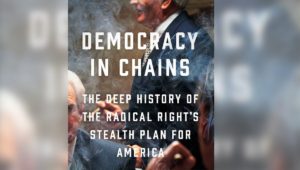The more financial freedom that is actually possessed by each member of the American common class, the better our society will be. It is my belief that basic income is the next, best practical step we can take to secure that freedom for our generation and generations to come. How will we pay for it? What about the moral hazard it creates? My respective answers to those questions are, in short, taxes and replacing some other programs, and giving people money doesn’t make them suddenly irresponsible. My respective answers to those questions in longer form follow below.
How can we afford to pay a basic income?
We would have to collect about $2.6 T annually in order to pay every American over the age of 25 $1,000 a month permanently. How could we possibly generate that much federal revenue?
- $1.2 T from a 20% Value Added Tax
- $0.7 T from replacing the first $1,000 of Social Security Insurance (SSI) payments
- $0.3 T from replacing the other cash equivalent safety net programs
- $0.2 T from replacing the first $1,000 of Unemployment Insurance (UI) payments
- $0.2 T from a 0.5% financial transaction tax
I’m an armchair economist doing barstool math on a napkin. Still, look up these numbers for yourself. These aren’t unreasonable estimates. People often argue against the unreasonableness of basic income in principle but they usually aren’t arguing against the math behind the proposal. They are understandably repulsed by the seemingly unreasonable idea of giving away free money. Emphatically, the basic income for which I argue is not free money, i.e., the costs need to be paid before the distribution is made. We should not ask the Federal Reserve to print funds out of thin air for the American people like they did for the American corporations in the 2020 Covid-19 crisis. The money to fund basic income should come from the winnings that manifest in a thriving economy. When business to business transactions are performed, the American common should win. When Wall Street risks and loses, the American common should win. When Wall Street risks and wins, the American common should win. We need to understand collectively that the present and future prosperity of this country depends not on the balance sheets of hundreds of multi-billionaires but on those of millions of multi-thousandaires. Getting basic income started isn’t a matter of having the money, it’s a matter of directing it.
Many on the political left dislike the idea of replacing any of the current cash assistance programs operating today with a basic income. I understand the moral content and purpose of that objection but I thinks it’s logically unnecessary in light of what a robust basic income brings to the table. I’m paying into social security, I’ve received general relief and food stamps in my past, I’ve utilized the earned income tax credit almost every year of my adult life, I’ve applied for unemployment insurance (I didn’t get it). I’m not morally opposed to these programs. They exist for important reasons. The same reasons for which I argue for a basic income. Also, I’m very aware that there is a popular Libertarian push to shrink these programs in the name of smaller government and less government involvement in socioeconomic affairs generally. I am an opponent of the philosophy behind that specific push. I don’t subscribe to the big government/small government dichotomy. I’m working for smart government, size agnostic. I believe in a robust simple safety net that gives common people the power to say no to every undesirable wage contract. I think cash assistance programs like the earned income tax credit, temporary assistance for need families, the supplemental nutrition assistance program, and the rest that add up to about $0.3 T in annual Federal spending should be entirely supplanted with a no less generous basic income. I also believe that most people who actually use those programs would prefer to get a no strings attached $12k/yr regardless of employment status, rather than the paternalistic spirit-sapping red-taped assistance that disappears the moment one accepts paid work. Still, SSI is for the elderly and UI is for the temporarily misfortuned. I’ll emphasize that I call for basic income to replace only the FIRST $1k/mo of those programs. I imagine many elderly and/or unemployed citizens that will still need assistance above which a basic income can provide. As a side note; the official definition of ‘unemployed’ would need to be seriously reevaluated if a basic income is passed into law. That said, I’m all in for those discussions when/if the time comes to have them. Elderly and unemployment situations should be considered case by case and the machinery necessary to make those considerations needs to be in place ahead of time.
Why do we do cash assistance at all? A generation ago, the answer to that question might have pointed to the idea of helping people in hard times. I agree with that philosophy and am aiming to make a more progressed version of that argument. The economic conditions that used to define hard times for those unfortunate few in the American common class are now a permanent consequence of the global labor market for commoners nation wide. One used to compete with their neighbors for local wage positions. Now, one is competing with every Indian, Filipino, Chinese, and European person of comparable skill. I disagree with calls for old school nationalism in response to these new economic truths. We should not revert to old fears. We should take this opportunity to blaze a cultural path for all the world’s common to eventually follow. We should continue to resist the concentration of power in the hands of the few. We should thoughtfully distribute power to the many and reap the benefits of widespread human prosperity. We should do cash assistance in such a way that common people have the financial power to say no to all undesirable wage agreements. In the current economic paradigm, almost every common person has to say yes to at least one local employer. This means that employers are only competing amongst each other for a particular would-be employee. That person typically surveys the wage positions available to them and accepts the least undesirable position because they have to accept some position to avoid destitution. I’m not knocking this paradigm at it’s foundation. I’m a capitalist. I believe in the power of private property and private enterprise. I celebrate this paradigm for the work it’s done against global poverty for the last century or so. This, to be sure, is the best socioeconomic system we’ve ever had. I’m actively opposed to almost all calls to “Destroy it”, “Defund it”, or “Burn it down”. I seek to fully stand on every economic advancement that the ostensibly free market has brought to bear. It seems to me that a labor market in which every potential laborer HAS to accept at least one wage agreement or else risk falling into poverty is imbalanced and unsustainable. Employers come to the table with capital. That’s pure power. Employers need employees. That’s a slight reduction in the employer’s bargaining power. To my eye, those forces offset each other to make the employer’s initial bargaining position meaningfully neutral. Under our current philosophy, would-be employees need at least one employer. Reducing from zero gives us a net negative power position off the gate for the would-be employee. Also, it can be reasonably assumed for the majority of cases that involve a member of the common class that the prospective employee has insufficient capital to survive for very long without at least one employer. That’s another reduction in the would-be employee’s bargaining power. Here we sit with a 0:-2 power imbalance in favor of the employer. Employers rejoice. I’m arguing that we collectively ensure that each person be provided sufficient capital to be able to survive without ANY wage employment and therefore do not need at least one employer to eat and live. In my mind, this moves the bargaining power entering into the voluntary wage labor contract somewhat closer to 0:0. Let me take an important moment here to detail what I mean by “survive without ANY wage employment”.
What about the moral hazard it creates?
The potential for basic income to create a permanent social underclass is real. Some people are shiftless, dishonest, and unwilling to analyze their own behavior responsibly. To that end, basic income should remain basic. I believe it is best for all of us when each person is guaranteed a roof, food, and internet access. In California, $1k/mo can rent you a bedroom, secure a laptop, and keep your stomach full of cheap noodles. In other states, that income might land you a studio apartment and the same diet. Every citizen in this country should have the right to pay attention to whatever they want, whenever they want, for their entire lives. That’s what basic income should protect; attentional autonomy. The government shouldn’t guarantee a private apartment, comfortable furniture, a television, a phone, steaks, gym memberships, or anything like that. I do support national healthcare but that’s a discussion for another time. The definition of luxury changes over generations. I choose not to define a roof, food, and internet access as luxuries. Basic income should not afford a luxurious lifestyle. That’s a moral hazard I also warn against.
The concern about a political slippery slope of calls for perennial basic income increases is a reasonable one. If we pass $1k/mo, what’s to stop the next candidate from running on $1,200/mo and $2,400/mo the candidate after that? The VAT is a very difficult tax to avoid and, even more so with a basic income in place, the American common person is a highly attractive customer. A basic income is very likely to increase the standard of living for the common American recursively. Democracy is an experiment in the distribution of power that I agree with wholeheartedly. The level of well-being for our species should be measured as the level of well-being for our collective common classes. Basic income would also be an experiment in the distribution of power. I believe in humanity, I believe in the free market, and I believe in the wisdom of the crowd. If we find ourselves considering candidates that will raise the basic income against candidates that will not, I would imagine that the definitions of ‘basic’ and ‘luxury’ have been moving higher and higher on the relative scales of material prosperity for some time and I will likely consider those events evidence of generational cultural progress. I therefore recast the concern for a negative slippery slope as the inspiring potential for an increasingly positive well-being feedback loop. Passing one basic income might encourage us to raise the level higher and higher and that would be a good thing as long as we aren’t fearfully running ahead of an ever increasing cost of living. In this situation, a goods and services market that fosters actual competition will be a powerful tool for keeping prices down and quality high. Basic income would guarantee a profitable market for low cost, high quality housing options. Internet companies should actually compete to provide service to single locations as opposed to the largely region locked faux competition we have in America today. It’s easy to imagine out-of-touch oligarchs greedily perverting market forces to the detriment of us all and blaming basic income at the first opportunity. We’ll have to guard against that then as we have to guard against it now and I believe a democracy equipped with basic income will be able to erect impressive protections against the corrupted whims of the elite class.
If we institute a basic income, some people will rent rooms (or sleep rough), live on unhealthy food, pay attention to unhealthy content, cultivate deadly habits, and die early from preventable illnesses. Understandably, there are already many thousands of citizens who wittingly engage in that lifestyle. People who are currently irresponsible will remain irresponsible. I’m not recommending basic income as a remedy for that particular social problem. I think personal irresponsibility has to be addressed at a personal, individual level. Hopefully, these citizens’ families and friends can rouse them into better living at some point. The relevant question then becomes ‘What percentage of people who don’t currently behave this way will be incentivized to shrink in that direction after the checks go out?’ My short answer is: very close to 0%. When we’re talking about growing savings and asset values from $0 (or less) to $1M, I think most people will become more excited, more clear eyed, more ambitious, and more focused the higher on that ladder they go. I believe most people are responsible. I don’t know how we could’ve brought our species this far if the reverse were true. If most people were generally irresponsible, the dark ages probably would’ve been the last ages. I believe in humanity, all things considered.
The common class is made of all non-elite citizens. Those who are comfortably above water but don’t feel the need to acquire a yacht, those who don’t typically aspire to join the international multi-billionaire class, even though they could if they tried, and those who take pride in the fact that their lifestyles can reasonably be attained by most people with common amounts of effort and luck, I consider those to be the prosperous ranks of the common class and we should all aspire to celebrate their abundance. Numerically, I imagine the common as every American that earns $500k/yr or less in income and has $1M or less in liquid assets, not including an inherited single family residence. Considering others in the commons, we can draw dim lines between clear minded citizens who choose to live on the streets (of whom I’ve met a handful), drug addicts and mentally ill people who are on the streets because they lack skills, connections, and/or the wherewithal to live differently (who likely makeup the majority of the homeless population), responsible citizens who have been pushed out by the depersonalized sharp edge of the labor market, nomads, commoners who are being cut by the cold blade of business-as-usual predatory lending but, for the time being, remain solvent and indoors, and those who are barely above water, within one or two missed paychecks of joining the previously described groups. Basic income will help all of these people in some way. Unfortunately, we may need to highlight an exception here (for the idea that basic income will help them more than harm them, not the idea of receiving the basic income itself) for the addicted that are not otherwise mentally ill. I admit that basic income will likely allow many currently irresponsible people to cut their self inflicted wounds even deeper. Morally, destitution should be the destination for objectively capable people that repeatedly reject help, resist all opportunities to take responsibility for their actions onto their own shoulders, and willfully continuously choose to destroy themselves. I want to be clear and emphasize destitution, not starvation, torture, or undue hopelessness. My operating definition of destitution is living in a terrible community with many terrible people, eating horrible food, and rotating your attention between the frivolous, the hedonistic, and the poisonous. Imagine skidrow indoors. Places like that will likely continue to exist, despite our common efforts to the contrary. As long as they do exist, we can choose to view them as a final bedrock bottom for the stubbornly irresponsible that preserves those peoples’ ability to hope for a better future while they battle with hellish living conditions. We can also choose to view those places as a visceral warning to those presently responsible adults fortunate enough to detect their own downward psychological spirals as they burgeon. The streets are mean. If you choose the streets, you’ve chosen dangerously. There are, have been and will continue to be, abundant free programs that will take the chemically dependent off of the streets if they so choose. I’d predict that basic income would actually have a tremendously positive impact on those programs by allowing people with loved ones trapped in grotesque poverty to volunteer much more of their personal time and attention to those rehabilitative efforts. I visit the Los Angeles skidrow frequently enough to know that a basic income will likely be a catalyst for the self destruction of many citizens in that segment of the common class. Still, people have to take full responsibility for their own actions. Irresponsible people will continue to be irresponsible. That said, when/if they do accept help and get on their feet, there’s a basic income ready to help them along the challenging uphill climb back to health and well-being. The widespread economic benefits of a generous basic income for common Americans enormously outweigh the painfully visible cost of human potential in the cases of the irresponsibly addicted. Still, arguing that lazy drug addicts renting motel rooms on the public dollar is worse than a global elite making themselves financially impervious to common grievance in the ugly light of unabashed generational rent seeking, read: perennial lending and ownership, is failing to see where the seat of power should rest for the benefit of present and future humanity. Power to the people. Power to retail salespersons, cashiers, office clerks, food workers, nurses, servers, customer service representatives, cleaners, farmers, warehouse workers, truck drivers, and administrative assistants. To object to giving common people the ability to say no to undesirable wage agreements is to support keeping desperate Americans desperate.
These are a couple of popular cultural myths ‘I’m not lazy but my neighbor is.’ and ‘I work hard because I enjoy working but I think I’m in the minority.’ When it comes to work ethic, we all fall short of our ideal. The question is ‘What is your ideal?’ When I was a teenager, I thought working 40hrs/wk for some random company doing some random thing that I basically enjoyed and didn’t find too strenuous was the definition of hard work. I’ve grown since then. Elon Musk works hard, period. That’s the standard we have to bear if we want to improve the future condition of our species. My point is that people work hard or don’t because of how they were raised and the choices they made along the way. Basic income gives people who might, on a coin flip, be crushed into destitution by global capitalism the chance to stand against that force and make something great of themselves. I want everyone to have that chance and we can’t afford not to give it to them.

Attentional Autonomy
Attentional autonomy is the ability to pay attention to whatever you want, whenever you want, for the duration of your life. It’s arguably the most important privilege afforded to children born into families with financial means. Those children are explicitly encouraged to take entrepreneurial, philosophical, or vocational risks as teens, 20s, and 30s, supported if they fail spectacularly in succession, and confidently resolve that their ability to recover and try again will likely remain intact. Attention is the one true currency. Unfortunately, only a minority of us are explicitly allowed to spend our attention however we want and whenever we want, assuming that those tasks are within the legal bounds of civil society. On this front, we are making cultural progress. Many, if not most, professionals today will gleefully admit that their source of income is also a labor of love. People WANT to make art, do philosophy, and multiply their talents for the betterment for their families and their community. These are some the tasks that most people will likely attend to in greater frequency with a basic income in effect; learning new skills, spending more time with their families, and volunteering for good causes. To be sure, profit is a powerful human motivator. Profit will still remain a beneficial incentive well after basic income is implemented but profit is not the only human motivator and our culture needs to also incentivize those vital human tasks that spiritually enrich us all but aren’t themselves inherently profitable; attentively raising children, garden-to-table horticulture, learning and playing as ends in themselves, having difficult political discussions, etc. These are the activities that make the future brighter than the past. These are the activities that have brought us steel, machinery, and computing. There’s no doubt that we all stand on the shoulders of smart people with free time. I believe that most people WANT to participate in human progress to some degree. If we are to become a multiplanetary or interstellar species, we will need to cultivate every ounce of human potential. Almost every human who activates that socially critical amount of their own potential, more often than not, did so as a free person. Free to attend to whatever political, personal, or intellectual challenge they found interesting at the time. We need each other to be better. Basic income is a great step in that direction.



